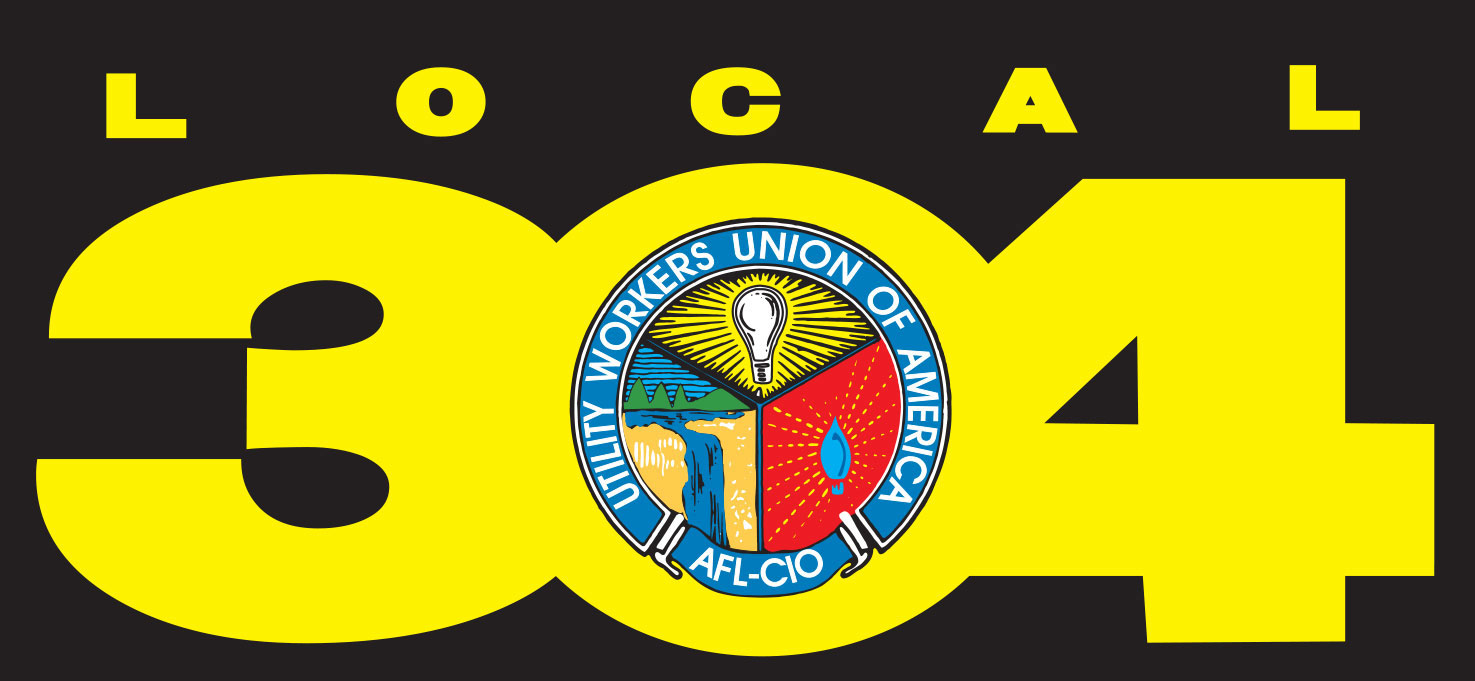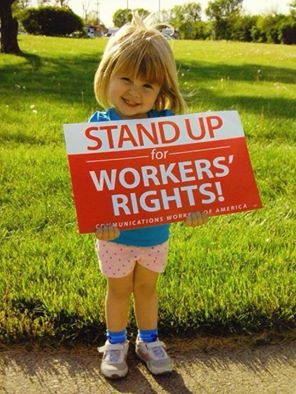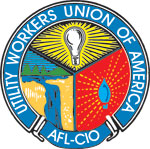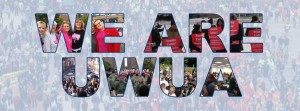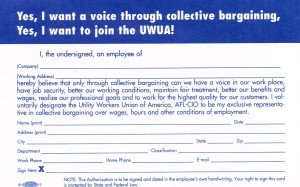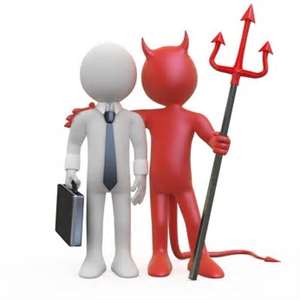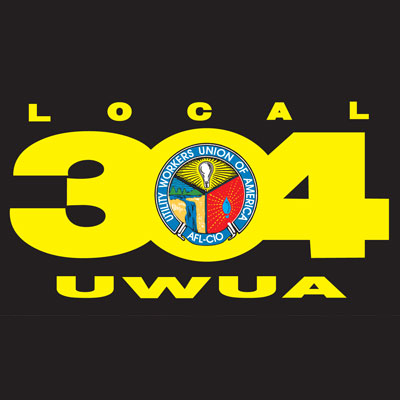Working Without Prosperity
Anyone who works deserves to have some small amount of success, even if that success only consists of the feeling one gets from being a self-supporting and contributing member of society.
West Virginians are in a special circumstance when it comes to work and prosperity. After decades of labor strife, a few coal miners did see a brief period of prosperity from their labor, but with the shrinkage of unionization and the influence of the UMWA, even that small window seems to be closing.
see a brief period of prosperity from their labor, but with the shrinkage of unionization and the influence of the UMWA, even that small window seems to be closing.
Before the industrial revolution and the discovery of our rich coal reserves, West Virginians were mainly farmers, trappers, and hunters. As our country moved deeper into industrialization, those who would seek to exploit our rich coal supply for their own greed moved into our state. They cheated landowners, bought political influence, and set up shop at the head of many hollows to establish mines and start hauling out West Virginia coal.
 West Virginians themselves have not benefited nearly as much as those absentee landlords who owned and operated the mines they worked in. As a matter of fact, West Virginia continues to be one of the poorest states in the nation, an odd happenstance that is in contrast to our rich energy and timber reserves. What workers of this state have reaped are pollution, destruction, and death.
West Virginians themselves have not benefited nearly as much as those absentee landlords who owned and operated the mines they worked in. As a matter of fact, West Virginia continues to be one of the poorest states in the nation, an odd happenstance that is in contrast to our rich energy and timber reserves. What workers of this state have reaped are pollution, destruction, and death.
On December 06, 1907, the Fairmont Coal Company mine in Monongha blew up, creating the worse mine disaster on record in the United States before or since. Official numbers set the count at 361 dead, but this was an era of child labor and the flood of immigrants who worked, undocumented, beside family members who were paid by the short ton for all the coal they loaded each shift. Many old timers claim that the count was far higher, possibly as many as 600, when taking these factors into account.
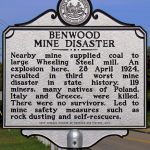 Then there is the 38 miners lost in the Boissevain Mine explosion in 1932, or the Consol #9 mine explosion in Farmington in 1968 that claimed 78 miners(the third such explosion in the mine formerly known as Jamison #9), or Holden, Nellis, Robinson-Ferrell, or Eccles #5 and #6, or the Clinchfield Coal Company’s Compass Mine at Dola, just up Route 20 from Lumberport that killed 22 men. Sago and Upper Big Branch are names of West Virginia mines added to the list of disasters visited upon the people of our state and that have become synonymous with tragedy and loss.
Then there is the 38 miners lost in the Boissevain Mine explosion in 1932, or the Consol #9 mine explosion in Farmington in 1968 that claimed 78 miners(the third such explosion in the mine formerly known as Jamison #9), or Holden, Nellis, Robinson-Ferrell, or Eccles #5 and #6, or the Clinchfield Coal Company’s Compass Mine at Dola, just up Route 20 from Lumberport that killed 22 men. Sago and Upper Big Branch are names of West Virginia mines added to the list of disasters visited upon the people of our state and that have become synonymous with tragedy and loss.
Lest anyone thinking that the plight of West Virginia workers lie only in the dark coal mines of our state, there is also the collapse of a scaffold in a  cooling tower, known as the Willow Island disaster, that killed 51 workers in 1978.
cooling tower, known as the Willow Island disaster, that killed 51 workers in 1978.
In fact, the worst industrial “accident” that ever occurred had nothing to do with coal mining, but happened in the New River Gorge area of West Virginia. This was the Hawks Nest Tunnel tragedy. This project of Union Carbide sought to divert the New River for power production to feed the plant in Alloy, West Virginia. Began at the height of The Great Depression, workers dug the 3 mile tunnel in record time, completing it 10 weeks ahead of schedule. The workers, desperate for gainful employment, either  did not know or understand that they were digging through Silica, a substance that causes silicosis in the lungs and is very damaging and even fatal. Many people have stated that it is impossible to quantify what a workers life is worth, but after years of lawsuits against the tunnel’s contractor, the settlement ranged from $400.00 for an unmarried black man to a $1000.00 for a married white man. In typical West Virginia fashion, the offending company settled $4 Million dollars in lawsuits for a paltry $130,000 dollars. Half of that settlement was claimed by the attorneys representing clients, who also recieved an added secret sum of $20K in the settlement insuring against any further lawsuits, and, on
did not know or understand that they were digging through Silica, a substance that causes silicosis in the lungs and is very damaging and even fatal. Many people have stated that it is impossible to quantify what a workers life is worth, but after years of lawsuits against the tunnel’s contractor, the settlement ranged from $400.00 for an unmarried black man to a $1000.00 for a married white man. In typical West Virginia fashion, the offending company settled $4 Million dollars in lawsuits for a paltry $130,000 dollars. Half of that settlement was claimed by the attorneys representing clients, who also recieved an added secret sum of $20K in the settlement insuring against any further lawsuits, and, on  the demand of the defendants, turned over all plaintiff files to them. In total it has been claimed that almost 500 workers died from exposure to silica dust. This number cannot be certified since tuberculosis was rampant throughout the country at the time and many may have died and been classified as victims of TB. What is known that death by overexposure to silica is a painful and miserable way to die, with one family member claiming that an affected relative actually kicked the bed they were dying in to pieces when in the throes of a fit of spasmodic coughing and gasping for air.
the demand of the defendants, turned over all plaintiff files to them. In total it has been claimed that almost 500 workers died from exposure to silica dust. This number cannot be certified since tuberculosis was rampant throughout the country at the time and many may have died and been classified as victims of TB. What is known that death by overexposure to silica is a painful and miserable way to die, with one family member claiming that an affected relative actually kicked the bed they were dying in to pieces when in the throes of a fit of spasmodic coughing and gasping for air.
Families of West Virginia workers also suffered indirectly, through the loss of the  bread winner and patriarch of the family, but also suffered directly from those who came to our state to rape the land, reap the resouces, and then leave like thieves in the night. Each incident described above represents grieving widows, orphaned children, heartbroken parents, and all the social and economic woes such conditions cause.
bread winner and patriarch of the family, but also suffered directly from those who came to our state to rape the land, reap the resouces, and then leave like thieves in the night. Each incident described above represents grieving widows, orphaned children, heartbroken parents, and all the social and economic woes such conditions cause.
Earthen dams had been simple and easy contructs for coal companies to capture coal wastes. That was until the Buffalo Creek Disaster in 1972. Pittston Coal had a dam at the head of a hollow on Buffalo Creek, WV. In a torrent of several days of  rain, the dam became sodden and soft. On the morning of February 26th, the dam burst. Many residents were still asleep when a wall of muddy coal waste laid waste to everything in it’s path An estimated 132 million gallons of water came roaring down the valley, killing 125 men, women, and children. 1,100 people were injured and 4,000 homes were destroyed. An emergency shelter was set up at the Man High School and survivors combed the wreckage looking for loved ones and lost possessions.
rain, the dam became sodden and soft. On the morning of February 26th, the dam burst. Many residents were still asleep when a wall of muddy coal waste laid waste to everything in it’s path An estimated 132 million gallons of water came roaring down the valley, killing 125 men, women, and children. 1,100 people were injured and 4,000 homes were destroyed. An emergency shelter was set up at the Man High School and survivors combed the wreckage looking for loved ones and lost possessions.
Pittston later claimed the disaster to be an, “act of God”.
 An elderly female resident replied, “I never saw God drive the first slate truck up the holler.”
An elderly female resident replied, “I never saw God drive the first slate truck up the holler.”
Again, in actions so typical of our state, one of the last acts of departing West Virginia Governor Arch Moore was a settlement of the multi-million dollar lawsuits against Pittston for the insulting sum of $1 million dollars.
Stories of the children who survived the disaster recall how anxious and nervous they would get everytime it rained.
 Why is all this worth recounting?
Why is all this worth recounting?
It’s because this is a history of labor in West Virginia. Despite the Mine Wars which shed some light on workers issues. West Virginians have, by and large, been poorly represented by local, state, and federal leaders, and exploited by ruthless corporations. It has been West Virginia workers blood that have purchased many of the country’s safety and health reforms, and it is those reforms that are under attack that we have to continue to fight for everyday.
The UMWA is one of the few unions to have any real success in this area. Those intrepid organizers for the UMWA braved the remote and rugged geography, faced down hired gun thugs, and brought a little social justice to exploited and abused workers in this state.
Another union that helped open the door for West Virginia workers is the Railroad Workers United, who represent railroad workers across North America, and fight the same issues as the rest of us.
It is this lack of representation that should inspire every worker in West Virginia to seek out a union of their choice and actively pursue joining. Unions are the purest forms of democracy in our country because they are ran by the workers, not politicians or absentee corporations. They are also an important source of vital information on issues affecting the industries they represent, giving workers information that is hard, if not impossible, to find anywhere else.
Unions that are organized and active act as checks and balances for people who work for a living and seem to be the ones largely ignored when political parties develop grand platforms promising prosperity and reform, but deliver more of the same year after year. Healthy and active unions hold these people to account for promises made in the heat of campaigns.

 The West Virginia AFL-CIO, with whom we are affiliated with, represents over 575 affiliated unions who fight for all West Virginia workers, whether they are union or not. Unions set the bar for wages, benefits, and working conditions for all workers. UWUA Local 304 would like to wish departing longtime President Kenny Purdue a happy retirement and welcome his replacement, Josh Sword, to the top job at the helm of West Virginia’s labor movement.
The West Virginia AFL-CIO, with whom we are affiliated with, represents over 575 affiliated unions who fight for all West Virginia workers, whether they are union or not. Unions set the bar for wages, benefits, and working conditions for all workers. UWUA Local 304 would like to wish departing longtime President Kenny Purdue a happy retirement and welcome his replacement, Josh Sword, to the top job at the helm of West Virginia’s labor movement.
Josh Sword Kenneth Purdue
(CLICK ON THE LINKS HIGHLIGHTED IN THE ARTICLE FOR MORE INFORMATION)
We Love Our Teachers!
” We are living history,” was the sentiment of Greg Phillips, Harrison County Education Association Vice-President at our last union meeting. He’s certainly qualified to male that call, being a history teacher at Robert C. Byrd High School, as well as holding a Masters Degree.
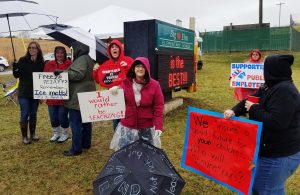
Greg came to our meeting to lay out the facts that have West Virginia Public State Workers up in arms. Lack of meaningful raises, loss of seniority protections, and changes to PEIA that will send health insurance premiums into the stratosphere, and possibly out of reach for many teachers. He lamented the fact that while West Virginia teachers are unionized, many other of our Public Employees aren’t. Without a union in place, all employers are “employees at will”, meaning they can be fired without cause and very little legal protection. Like all union members, it’s up to them to stand and fight for those who don’t dare stand or fight for themselves. They include the State Police, Department of Highways, Corrections Officers, Department of Health and Human Resources, Child Protective Services, as well as many other public employees.
How bad is the teacher situation in our state?
Teacher pay in West Virginia ranks 48th in comparison to other states (inversely, our PART TIME State Legislature’s pay ranks 5th in the nation compared to other states).

There are over 700 open teaching positions in West Virginia Public Schools.
Last year, WVU and Marshall graduated over 1500 teachers, and only about 400 stayed in this state. Others went to neighboring states where they can earn 20K-30K more for doing the same job.
80% of all West Virginians live within 2 hours of a state border (Maryland, Virginia, Kentucky, Ohio, and Pennsylvania).
The National Education Association and American Federation of Teachers have, for the FIRST TIME, united under one banner in this fight!
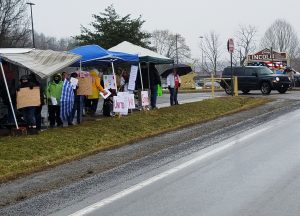
One big difference in the job of teaching as compared to other professions, the people who elect to become teachers feel a calling to that work. It’s common to hear such things like that when it comes to the clergy or medical professions, but often overlooked when it comes to teaching. The people who teach don’t do it for the money. Offsetting the mediocre pay was the fact that teachers have enjoyed good health insurance and a collegial working environment.
PEIA introduced something called “Go 365”. It’s a wellness program component added to PEIA, much like our own Health and Wellness program. Unlike our program, which is incentive based, PEIA’s is a penalizing program. What this means is that if you do not participate, you will be penalized with higher health insurance premiums. As an example of how intrusive and unreasonable this is, Go 356 requires teachers to sign up at a gym or fitness center, BUT, it must be an “approved” site. One teacher learned that his closest eligible fitness center was over three hours away!
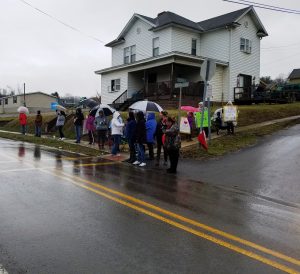
Teachers are so important to our society. Just last week, three teachers gave their lives in the Florida school shooting protecting students. Other teachers do less heralded, but equally heroic things to protect children. Teachers are another major part of our nation’s social safety net. They do so much more than just teach. They monitor, counsel, and even worry about their students, much like surrogate parents. In some cases, teachers may be one of the few positive examples of adult authority figures in some kids lives. There are personal costs, even after the financial ones teachers encounter when they spend their own money for classroom supplies. There are horror stories that teachers carry with them long after the student moves on, worthy of any battlefield action that causes PTSD in many of our country’s vets. These are offset by other stories of a child who succeeds against all the odds stacked against them to become a very wonderful and special person.
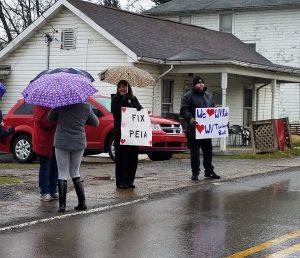
Unions too often are equated with politics. This is especially true for public sector unions when a political majority takes control that has an anti-worker philosophy. In this, it’s public sector unions who are usually the first to sound the alarm when they start seeing union-busting and worker punishing legislation being offered in statehouses all over the country. It’s no wonder that unions find themselves in the crosshairs of those who use their elected positions to benefit themselves and their cronies.
Teachers fall into that unique category of public sector jobs that are being demonized by some lawmakers and their stealth PACS ( along with police, firefighters, postal employees, and many other groups). These folks would have YOU to believe that public schools are an antique anachronism left over by the previous century and teachers are in the business of indoctrinating your kids in all things evil in the world and brainwashing them into accepting that’s the way it should be. They want you to see teachers as an enemy, and the campaign against them has intensified by some claiming teachers don’t care about parents having to make sitting arrangements or children being without school provided meals. What’s NOT being talked about is the work teachers have done, working through churches and other civic organizations, to provide meals and childcare during the walkout.
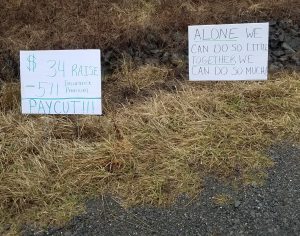
Of course, parents that are dedicated and engaged in their children’s education know better. To them, teachers are partners and assets in building their kids into well rounded adults. Teachers are also union members, and they would much rather be in the classroom than on the picket line!
There’s a reason why unions are called “locals”. That’s because the membership is made up of your friends, family, and neighbors. It takes a breakdown of community for these folks to quit talking to each other, opening the door for them to fall prey to the decisiveness of special interests propaganda designed to divide us in every possible way.
A good example is what recently happened to Oprah (yes, that Oprah) when her name was half-heartedly floated as a possible 2018 challenger of President Trump. Not very long afterward, you could see memes being floated attacking Oprah Winfrey on every conceivable level. Oprah has never acknowledged, much less announced that she has any interest in being the President of the United States.
Bottom line is that West Virginia’s entire future starts with our being able to attract and keep the best, brightest, and qualified teachers. To do this, teachers need a decent wage, good health insurance, and protections and respect for their seniority earned over years of educating students. The enemies of teachers are pushing for Charter schools, or a voucher program .This is the privatization of education into private, for profit, hands. This turns education into a pay to play scheme designed to funnel tax money out of public schools and directly in the hands of privateers. The winners are the Charter school owners and the rich kids who can afford the tuition. The losers are the teachers, the poor kids, the special needs kids, and disabled kids, whom the charter schools do not have to accept.
This is why we MUST support our teachers in this epic struggle.Even the cold wet weather could dampen the fire of our local teachers. There were horn blasts, shouts of encouragement, and a general outpouring of support as they waved signs and cheered in the rain. The struggle they are in is for the benefit of all West Virginians, and as for those who work against West Virginia’s workers; WE WILL REMEMBER IN NOVEMBER!
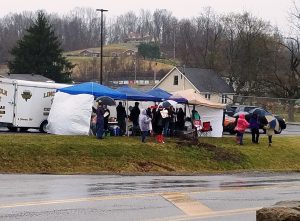
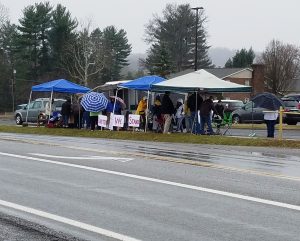
Why Union Jobs Matter!
There can be no doubt that there were more than the candidates taking center stage in the 2016 Election. Ahead of all the candidates and issues was a force greater than the accumulated individual parts and pieces. That force was anger.
Though almost 50% of Americans stayed home on Election Day, either due to apathy caused by the belief that their choice didn’t matter, or a fundamental feeling that they don’t matter; the rest of the voting public battled openly and advocated loudly for their choice of candidate.
The candidates themselves seemed fatally flawed. One candidate, a product of the ultra-rich elite who rode the back of political maverick and outsider; the other a well known face and political powerhouse whose service in her many posts and positions left a polarizing effect in the minds of the electorate.
To many, even of her own party, Hillary Clinton was the same as having no choice at all. Surprisingly, many in the other party viewed Donald Trump’s candidacy with the same ire and misgivings. Both Presidential hopefuls burned away the long standing colors associated with either party, colors thoroughly bleached out by the white hot anger of the voting public.
So why are Americans so angry?
Of all the issues broached during the 2016, income inequality was the one that resonated the most. The messenger, an old time radical and self described Democratic Socialist, became the lightening rod that energized his adopted party’s message. As the Democratic campaign wore on, Clinton’s rhetoric slowly began to change to the point of her trying to sound like Bernie Sanders.
Regardless of party affiliation, the message of income inequality was one that cut across those hard drawn party lines. The bottom line for almost all voters was that the American public is tired of paying high taxes to a government that seems to takes them for granted.
It’s a fact that unions built middle class America. Unions gave workers a voice, and that voice demanded that the people actually doing the work, while not getting rich, should at least be able to live decent lives and provide adequately for their families.
However, the attack on those wages and benefits that combine to make up a job that makes work pay are relentless. Americans were warned back during Bill Clinton’s Presidency about so called “Free Trade” (NAFTA, CAFTA, …) agreements, that the intent of exporting American economic success would open the door to importing third world wages and working conditions by trying to compete in markets that exploited workers and regimes that did not respect the rules of business, human rights, or the rule of law, in general.
Falling wages and decreased opportunities have hit the middle class hard. In households that are lucky enough to have one breadwinner with a good job, there is a drain on that family’s income in supporting immediate family who can’t find work that provides a decent living.
Forget the toys and hobbies many adults indulge in, more and more it’s taking both parents working full time to earn enough just to survive. Parents are juggling mortgages, bills, tuition, taxes, and everything else that takes cash to plug the holes that seems to always crop up. It seems that everything in our society is geared at squeezing more out of those who contribute the most.
This brings us back to the original problem, income inequality. This is where we see the great chasm that form up the two competing political philosophies.
One side blames social programs and handouts for our ballooning deficit, a situation promoted by the advocates of a progressive agenda.
The other side says corporate welfare and greed is to blame for the woes facing us as a nation.
One side wants to double down on trickle-down economics with yet even more tax breaks for the rich, while the other wants to return us to a system that punishes the successful with an aggressive tax hike. Neither side wants to compromise, so our country limps along in “safe mode” with no end in sight.
Unions are more relevant than ever. We are the frontline that fights for all workers. We fight for wages, working conditions, pensions, and most of all, safety.
 Whether you realize it or not, unions affected your employment at Harrison long before 304 certified as a union in 2010. Before 304, we had UWUA System Local 102 to our north, and Rivesville was union. These facts directly contributed to what wages and benefits would be set for Harrison. Rivesville’s union succumbed to fear of plant closure and a slick campaign that undermined the union and the company was able to bust that union. This left only System Local 102 as the gatekeeper protecting wages and benefits for Harrison. Since 2010, we’ve seen System Local 102 almost reduced to a lineman’s union with the closure of all the plants in their jurisdiction.
Whether you realize it or not, unions affected your employment at Harrison long before 304 certified as a union in 2010. Before 304, we had UWUA System Local 102 to our north, and Rivesville was union. These facts directly contributed to what wages and benefits would be set for Harrison. Rivesville’s union succumbed to fear of plant closure and a slick campaign that undermined the union and the company was able to bust that union. This left only System Local 102 as the gatekeeper protecting wages and benefits for Harrison. Since 2010, we’ve seen System Local 102 almost reduced to a lineman’s union with the closure of all the plants in their jurisdiction.
This is why UNION JOBS MATTER!
304 has been pushed into the position of being the primary defenders of what wages and benefits will be for plants in our geographical area. We’ve had a lot of help, from an embattled System Local 102, our longest and most loyal ally. As we’ve grown, we’ve also found new allies, such as UGWU Local 69 at Dominion and UWUA Local 537 representing employees of West Virginia American Water. We’ve also formed bonds with other unions within our merged company, most notably UWUA Local 270, as well as other trade unions.
304 is able to form these relationships because when we talk to other unions it’s blatantly obvious that we are not alone in the challenges and issues we all face. We have more in common than we do differences, making it clear that we can only face these challenges effectively as a united front and by looking out for each other.
Bargaining power comes from SOLIDARITY!
How many people have YOU, as a union member, helped, or are helping, because of the financial resources of having a good UNION job allows you? How many in your family depend on those wages and benefits you are able to provide them?
This why it is so important that you are UNION!
As a member of the UWUA, you take your place among other serious professionals who are our union Brothers and Sisters, whether they be teachers, firefighters, machinists, laborers, carpenters, pipefitters, ironworkers, steelworkers, electricians, auto workers, painters and plasters, and many others who long ago realized that as workers we have to band together to protect each other from those business forces that seek to make all of us economic wage slaves.
UNION JOBS MATTER!
Union is a union is a union…
You may have noticed, especially on our Facebook page, that when UWUA Local 304 reports union news, it may not be a UWUA union.
Confused?
This is because the one guiding principal behind EVERY union is workers standing together for the betterment of all. Sure, many unions have their own unique ways they handle administrative details, have their own take on organizing and showing action, but each one, at it’s core, are just working people taking a direct hand in protecting and serving each other.
We are all familiar with the Boilermakers, Ironworkers, Pipefitters, Carpenters, Laborers, Millrights, Operating Enigineers, Miners, and Electricians we work with everyday, but there are many other unions that represent the people in their own professions. Teachers, nurses, firefighters, police, railroad workers, machinists, Food and Commercial workers, Service Employees, Office Professionals, Autoworkers, and many many others who do their part in their respective fields.
Being union, and having that special legal status, tells the world that you are a seious professional who knows how to the job right and safe. Being union means you value training and professional development, but it also means that you take pride in your role as a American worker and citizen.
As much as employers try to tear down unions, you’d think there’s nothing about unions they like, but that’s not true. Employers look to hire people out of unions because they are a known quantity. Union workers, as a whole, are well trained, drug-free, and have the work ethic that they want in their organizations. Fact of the matter is, employers recognize and appreciate the talents union and former union workers bring with them right up to the point it’s time to talk pay and benefits.
So don’t let the fact that we mention other unions when we talk about issues. That’s one of the greatest strengths of being union is the sharing of knowledge within our union family. If you need proof of this, just click on any of the links above for other National Union’s webpages. You’ll see that they fight for and against many of the same things as we do.
When it comes to the question of should you stay union, remember, “If You Don’t Know, Don’t Go.”
We’re all in this together!
Constitution Optional
Some may wonder why 304 would elect to have so many articles about the past on our website. The answer is that most people are ignorant (meaning uninformed, NOT stupid) about our labor history, not having been exposed to it in school or at home. This has left a gap in the public consciencesness of the many complex and unexplained ways social and political attitudes and trends can affect working people in real time.
Regardless of who you voted for, it’s undeniable that the 2016 election will go down as one of the most controversial in American history. So many allegations among so many unpopular candidates left us with an electorate and country with deep philosophical and social differences.
Media bias was one charge leveled by both campaigns against the other periodically throughout the race. The media took a beating, even literally, in trying to cover and convey each candidate’s platform.
Freedom of the Press is one of the most fundamental rights that our founding fathers agreed was important in making us a just and moral society. Over the years, this right has taken everything from potshots to downright sieges in one party or the other attempting to muzzle the opposition.
One successful suppression of opposition happened in Huntington, WV, on May 9th, 1912. A newspaper office was raided by militiamen, on the orders of then West Virginia Governor Henry Hatfield. Under the direction of Major Tom Davis, U.S. Troops laid waist to the printing company’s presses, typesettings, as well as any printed material already produced by the printer.
The staff of the printing company were placed under arrest, then the Sherriff was ordered to turn his prisoners over to the military, who were then hauled to jail in Charleston. They were held without due process of law, and never charged.
The miltary then proceeded to Editor-in- Chief Wyatt Henry Thompson’s private residence and, over the objections of the his wife and even the Sheriff, proceeded to ramsack the home and remove many private letters and correspondence without any type of search warrants or writs.
You would think something like this would be unthinkable in a Democratic society based on law and justice.
The business the printing company was engaged in was printing a pro-labor, pro-union newspaper, and also serving the printing needs of the local unions that were trying to organize in the area.
The bottom line is; while many politicians try to incite fear and ignite rage in the voting public, the only times that the rights of Americans have been directly attacked has been during times of labor and racial strife. This is why we, as union members, must realize that LABOR RIGHTS ARE CIVIL RIGHTS.
Rifles are still occasionally found buried in the soil of southern West Virginia, left by the miners who dared to march against the corrupt Sheriff of Logan County, Don Chafin, during the Battle of Blair Mountain. They left their rifles buried in the forest because they knew that the militia, who were called out by the governor, but, like the good Sheriff, were working with the forces of the coal operators and would immediately confiscate the weapons as soon as they walked off the mountain (so much for the 2nd Amendment).
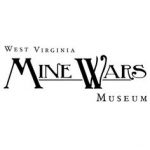 Truth is, our country’s sacred and much heralded Constitution was as much help to workers of the early 20th century, as a suitcase would be to a gorilla. Illegal arrests, kangaroo military courts, and even murder of men, women, and children were the norm for coal field families of West Virginia. Ruthless coal operators evicted families with small children out of their barely habitable homes and into the wilderness to die of starvation, disease, and exposure in tents pitched at the back of the hollows.
Truth is, our country’s sacred and much heralded Constitution was as much help to workers of the early 20th century, as a suitcase would be to a gorilla. Illegal arrests, kangaroo military courts, and even murder of men, women, and children were the norm for coal field families of West Virginia. Ruthless coal operators evicted families with small children out of their barely habitable homes and into the wilderness to die of starvation, disease, and exposure in tents pitched at the back of the hollows.
As if life hadn’t been hard enough, the coal barons did everything they could to make it even harder on the workers who dared to try and improve the miserable state of a hopeless way of life that seemed to consume the health and lives of all who toiled deep in the mines.
 Evidence that survived that period is on display for all to see at the West Virginia Mine Wars Museum, appropriately located in Matewan, WV. On display are the simple items used by mining families in the early 1900’s, like razors, and examples of the tents that many were forced to live in, plus a collection of coal company scrip (only redeemable at the company store), as well as many of the firearms from the period of the Mine Wars. Springfield rifles, chambered in either 30-40 Krag or 30-06 Springfield, as well as .45 caliber “Tommy” guns made famous by gangsters, and early Winchester lever action rifles that the coal companies bought in bulk to support the armies they created to oppress the miners. You can read the actual newspapers that celebrated the “Miners Hero”, Sid Hatfield. It was “Smiling Sid” who faced down the hated Baldwin-Felts agents in what would come to be known as the Matewan Massacre, only to be ultimately gunned down on the steps of the McDowell County Courthouse in Welch a year later by Baldwin-Felts agents (none of whom were ever arrested or charged).
Evidence that survived that period is on display for all to see at the West Virginia Mine Wars Museum, appropriately located in Matewan, WV. On display are the simple items used by mining families in the early 1900’s, like razors, and examples of the tents that many were forced to live in, plus a collection of coal company scrip (only redeemable at the company store), as well as many of the firearms from the period of the Mine Wars. Springfield rifles, chambered in either 30-40 Krag or 30-06 Springfield, as well as .45 caliber “Tommy” guns made famous by gangsters, and early Winchester lever action rifles that the coal companies bought in bulk to support the armies they created to oppress the miners. You can read the actual newspapers that celebrated the “Miners Hero”, Sid Hatfield. It was “Smiling Sid” who faced down the hated Baldwin-Felts agents in what would come to be known as the Matewan Massacre, only to be ultimately gunned down on the steps of the McDowell County Courthouse in Welch a year later by Baldwin-Felts agents (none of whom were ever arrested or charged).
If you are lucky enough to be in a union, the you owe it to yourself and your family to BE ACTIVE, and act in SOLIDARITY with your union Brothers and Sisters. When you hear a union officer saying that people fought and died for YOUR right to collectively bargain, they aren’t kidding.
Don’t believe all the bad press that claim unions to be outdated and dying.
Remember who owns the press.
Keep the faith in your union and each other. Don’t let the “charm campaign” of company owned stooges, or divide and conquer tactics employed by rich business moguls trying to pump up huge and unearned executive compensation or prop up sagging stock prices by cheating workers dissuade you in standing with those who toil daily right beside you.
As always, don’t just take OUR word for it, click on the links highlighted above to read for yourself
Make The Call!
The UWUA is a great union. They are not a third party, as they have been portrayed by employers in their carefully prepared union-busting talking points. The UWUA is an organization that is dedicated to making the working lives of their members better. They do this by following through when workers elect to vote them as their exclusive bargaining representative.
(pictured: Larry Kelley and Rich Cossell)
UWUA Local 304 can testify to this. The UWUA was there when we decided to become affiliated with the Utility Workers Union of America, AFL-CIO. They were there when dragging contract negotiations and a pair of votes rejected paltry contract offers and opened the door for an ill concieved decertification vote. They were there when that vote re-affirmed, with results even stronger than the original union vote, that Harrison employees wanted to be Utility Workers.
In the end, UWUA Local 304 members made a choice to trust each other to look out for our own best interests. A seat at the table beats being on the menu!
From the first Authorization card that was signed to the most recent Regular Monthly Meeting, and everywhere in between; the UWUA has never broke their faith in the membership of Local 304.
UWUA Local 304 now has a contract. Do you?
It wasn’t easy, but through hard work and the assistance, support, and expertise of the UWUA National; UWUA Local 304 defied the odds and is now a functioning and active union. As such, we are fighting for our members, just as the UWUA did for us.
Who’s fights for you?
If you want to know what the UWUA can do for YOU, give UWUA National Organizer Larry Kelley a call at (724) 263-1345, or e-mail him at hemikelley@comcast.net. Each call and e-mail is confidential. Larry will be glad to answer your questions.
Larry was a long time member of UWUA System Local 102 as a lineman, and since then has devoted his time and efforts to give fellow utility workers the same advantage he had during his working career by helping them to achieve their goals of guaranteeing their future by joining the UWUA.
He’s just one of the many people UWUA Local 304 owes many thanks. Men like Larry, Rich Cossell, Bernie LaBelle, Bob Houser, Sam McKnight, George Manoogian, and all the way up to President Mike Langford; each took a personal interest and was totally invested in 304’s success. These are just a few to whom we owe our gratitude to. We also made many new friends in other UWUA Locals, all of them dedicated to the purpose of making Utility Workers lives better.
It’s happening at Boeing in South Carolina, Mercedes in Alabama, Nissan in Mississippi, VW in Tennessee, and other workplaces across the country. In the face of a massive “Right To Work” push by corporate owned politicians, workers are finding they trust each other more than they trust billionaire business executives to make each others lives better.
New NLRB rules make it easier, so what’s holding you back?
You can live in fear, or inspire it! Organize 2 Survive! Make the call!
Click the links above to learn more.
(click to enlarge)
Lessons For Effective Management, Issue #1
Issue #1- Love Your Hell Raisers
There are a lot of books, articles, even whole magazines that are devoted to teaching managers how to be effective leaders so they can maximize their human performance for greater efficiency and profit. You have heard many of them mentioned on this site. Books by multi-millionaire CEOs that light the way for other CEOs, like “Jack Welch and the GE Way“, or Al Dunlap’s “Mean Business.” These books are so powerful that they spawned books about them and the authors, like “Chainsaw: The Notorious Career of Al Dunlap in the Era of Profit-at-Any-Price,” and, “The Billionaire Shell Game”.
Before the era of “GREED” and the philosophy of “ME”, management training focused on building relationships between management and employees through the values important to most of us, like decency, respect, forgiveness, and the lessons we learned about The Golden Rule; ““So whatever you wish that others would do to you, do also to them, for this is the Law and the Prophets” (Holy Bible, Mathew 7:12).
These principles were ingrained into us as Americans, and business and industry adopted them from lessons learned over decades of violent labor uprisings, work stoppages, and bloody strikes. Through concessions won through unionization, the American workplace evolved into an extension that reflected our society. The ideals of fairness, justice, and equality found their way to the shop floors and became the expected standard rather than the exception.
So what happened?
What happened was that working people mistakenly thought the war was over. We thought, wrongly, we had earned the right to simply go to work, do our job, collect our pay, and go home in peace. Meanwhile, the corporate masters were plotting, and then – BOOM– they launched their attack!
They didn’t aim their guns at the workers, who had been lulled to sleep by decades of labor bliss. So soundly we slept that we quit paying attention to politics and business trends. We didn’t go to our union meetings, and pretty soon our elected political representatives, as well as union officers, started looking out more for themselves and not us.
Still, we slept.
Then, a little at a time and after the corporatists put their political lapdogs to work to change the laws to justify it, wages and benefits started falling. Two-Tier contracts and concessions became the new norm. For those unions that were left, promises were made that these were temporary emergency measures to help workers keep their jobs and be competitive. Companies claimed that much of the cuts would not be necessary if they didn’t have to comply with the restrictive and outdated notions of collective bargaining agreements, so union membership fell more.
We were assured that our industrial base didn’t matter because we would all have high paying jobs in technology. Then the tech jobs followed our manufacturing out of our country and to those countries who have enslaved citizens who work for less than sustanance wages and live in abject poverty at the hands of their oppressive leaders.
Now, here we are.
Companies have been bought out or merged and then gutted for their usable parts and for mega-profit, irregardless of communities, workers, and jobs. CEOs are raking in huge sums of money, even when they bankrupt the business they run, as wages for those who do the actual work are in incremental retreat.
While we were told to worry about flag burners, abortionists, gays, and our guns; prevailing wage was killed, and “Right To Work” became the law of the land before we could even blink.
We are told to blame the welfare fraudsters, and that we should drug test the malingerers. In the meantime, the ones who unleashed the jackals of deregulation, greed, and reckless capitalism upon all of us are sitting in far away locales, via their private jets, where their money lays untaxed and hidden while laughing among themselves that we are so easily duped.
There are a few of us who woke up out of our coma early, looked around, and then sounded the alarm. We were labled “radicals,” “troublemakers’, and “hell-raisers.”
We prefer being called, “UNION THUGS”.
It used to be that innovativeness was an asset, creativity a positive, and self assuredness a virtue; now they are viewed as threats. When standing up was once admired, now it is feared. Those who dare, are labeled, targeted, and made examples of as a warning to others.
A lesson business needs to learn over is that they have a duty to treat their workers with dignity and respect. They can preach about it, codify it in long winded wordy corporate policies and guidelines written in eloquent legal-eze, and stop the war on wages, benefits, and working conditions.
To do this, they are going to have to do something that seems unthinkable to business leaders, and that is to embrace their hell-raisers, These folks are their conscience and they are passionate and fully invested in their jobs.
It’s the trouble makers, the radicals, and the hell-raisers that have moved this country forward for well over 200 years. They forced change when faced with injustice, they innovated when facing life’s challenges, and they found a better way to do things that were more productive, safer, and easier.
Together, working people created everything that America stands for and makes our country the beacon of hope it is seen as in the world. Without the radicals, we cease to be America. It’s a part of our identity, our culture, and our heritage.
Our Website’s Policy on Sharing
The UWUA Local 304 website is primarilty a blog more than it is an actual news site. It is a tool to keep our membership informed on issues affecting them and their families.
Anybody may submit their opinions for publication on our site by e-mailing them to our Local’s President or to our site’s webmaster. Just remember that we, as YOUR union, take the heat on anything we put out so we reserve full editorial control over our web content.
Our website has NEVER used a BYLINE (the name of the author of a particular posting). Part of this stems from the statement above, another part is that we WANT members to feel free to share their thoughts on our site without fear of ridicule or being targeted at work or home. This site does not exist to make anybody famous, it’s for communication with our membership, and the benefits that communication does for the good of our union.
We have A LOT of people looking at our website (from all over the world), and there have been inquiries from a few as to if they are allowed to borrow from our site.
In response to these requests, we have put together some very basic statements that embodies our philiosophy about anybody who may want to use anything we publish on our site.
We only ask that anybody using our content be a friend of labor.
You can read these statements by going to ABOUT US>SHARING POLICY.
States With Stronger Unions Have Stronger Middle Class
“This material [article] was published by the Center for American Progress Action” (Click to go to their site)
By David Madland and Nick Bunker |
New Census Bureau data on state incomes released yesterday show just how important unions are to creating a strong middle class. An update to an analysis in our April 2011 report, “How Unions Make the Middle Class,” finds that a 10-percentage-point increase in the unionization rate would boost the average annual income for middle-class households—unionized or not—by $1,501 a year. Ensuring the United States has a strong middle class is critical, as the middle class is the engine of economic growth.
Unions strengthen the middle class by advocating for workers both in the workplace and in our democracy. Organized labor not only fights for higher wages and better benefits at work but it also makes democracy work for the middle class and advocates for policies that boost the middle class as a whole. As the new Census data make clear, stronger unions create a strong middle class not only at the national level but at the state level, as well.
In 2011, for example, the five states with the lowest unionization rates—North Carolina, South Carolina, Georgia, Arkansas, and Louisiana—all had middle classes with below-average strength, with strength defined as the share of income going to the middle 60 percent of households. Four out of the five states with the highest unionization rates—Alaska, Hawaii, Washington, and Michigan—all had middle classes with above-average strength.
The chart below shows the state-by-state impact of increasing unionization rates by 10 percentage points, returning them roughly to their 1980s levels. All middle-class households would feel the effects of this benefit, whether they have union members or not. These figures are based on a regression analysis that looks at how unionization rates affect the share of income going to the middle class, while taking into account other important factors such as education levels, unemployment, the income level of a state, and industry employment mix.
The boost from increased unionization is roughly equivalent to the $1,664-per-household boost from increasing college attainment rates by 10 percentage points. Improving educational outcomes and increasing access to higher education are correctly pointed out as important steps for bolstering the middle class, but, as our numbers show, we should not underestimate the importance of unions.
The American middle class has weakened over the past several decades and now receives the lowest share of income it ever has—45.7 percent—since the data were first collected in 1967. We can begin to rebuild our middle class, however, starting with these 35 policies. As our analysis shows, strengthening organized labor is one of the most important first steps.
David Madland is the Director of the American Worker Project at the Center for American Progress Action Fund. Nick Bunker is a Research Assistant with the Action Fund.
Workers Standing Together Still Middle Class America’s Best Defense
Tim Paulson is the executive director of the San Francisco Labor Council, and his recent article in SF Gate he outlines what many in unions already know; workers standing together is the last line of defense against an ever increaing income gap caused by corporate greed.
Paulson strings together the picture faced by most working Americans, whether they acknowledge it or not. Read his article and you’ll see it doesn’t matter if you’re union or not, east coast or west, or just struggling to stay middle class.
